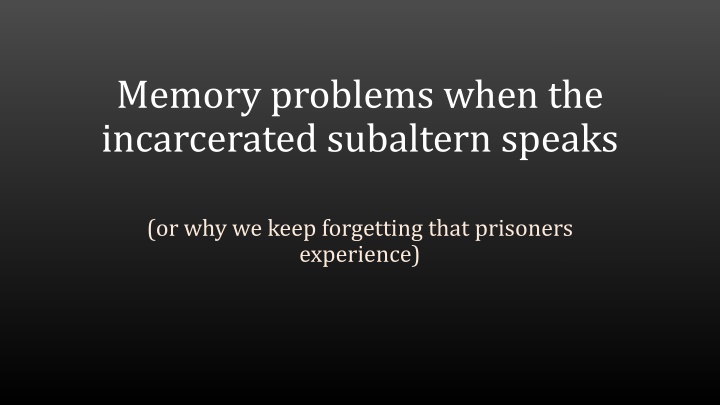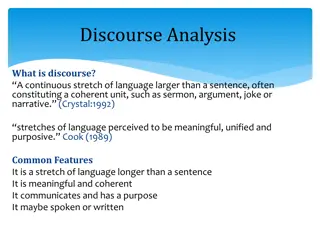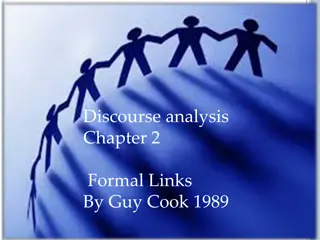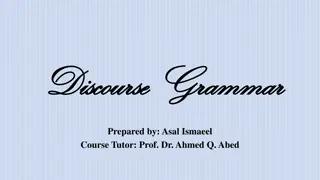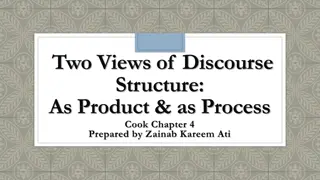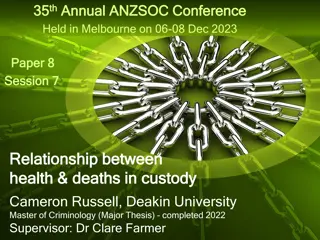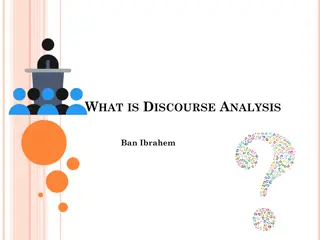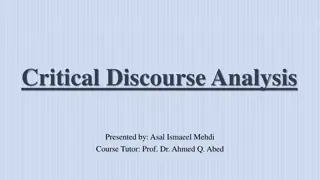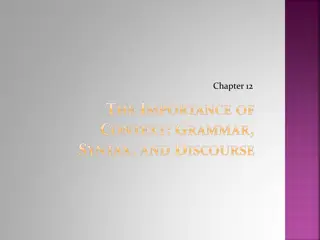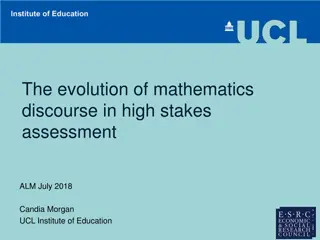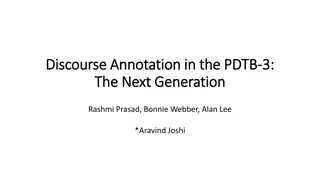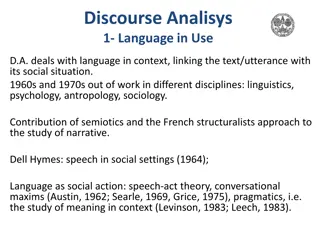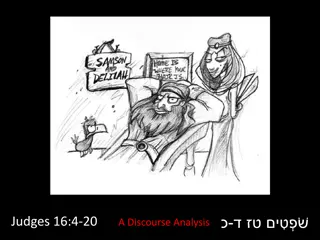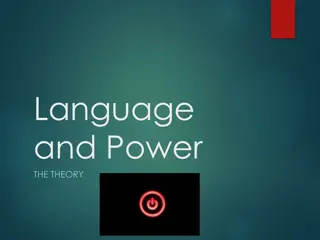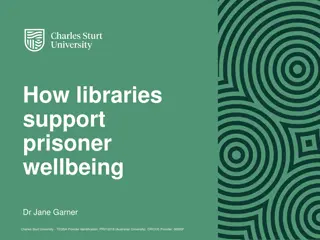Perspectives on Disremembering Prisoner Experiences in Academic Discourse
Exploring the overlooked narratives of incarcerated individuals, this collection of scholarly insights delves into the challenges faced by prisoners in having their experiences acknowledged and validated. Reflecting on works by Spivak, Code, Foucault, Kolodny, Fraser, and Young, the discourse emphasizes the importance of recognizing and amplifying subaltern voices within the academic arena. The discussions touch on themes of power dynamics, feminist theory, contestation of dominant norms, and demands for factual representation in narrative storytelling, particularly concerning incarceration and related traumas.
Download Presentation

Please find below an Image/Link to download the presentation.
The content on the website is provided AS IS for your information and personal use only. It may not be sold, licensed, or shared on other websites without obtaining consent from the author.If you encounter any issues during the download, it is possible that the publisher has removed the file from their server.
You are allowed to download the files provided on this website for personal or commercial use, subject to the condition that they are used lawfully. All files are the property of their respective owners.
The content on the website is provided AS IS for your information and personal use only. It may not be sold, licensed, or shared on other websites without obtaining consent from the author.
E N D
Presentation Transcript
Memory problems when the incarcerated subaltern speaks (or why we keep forgetting that prisoners experience)
the subaltern cannot speak Gayatri Chakravorty Spivak, Can the Subaltern Speak? (1988)
Lorraine Code What Can She Know? Feminist Theory and the Construction of Knowledge. Ithaca: Cornell UP, 1991.
knowledges that have been disqualified as inadequate to their task or insufficiently elaborated: na ve knowledges, located low down on the hierarchy, beneath the required level of cognition or scientificity Michel Foucault, Two Lectures , in Power/Knowledge: Selected Interviews and Other Writings 1972 1977, ed. Colin Gordon, Essex 1980, pp. 78 108 (83).
Annette Kolodny Dancing Through the Minefield: Some Observations on the Theory, Practice and Politics of a Feminist Literary Criticism Feminist Studies 6/1 (1980), 1-25.
in a contestatory relationship to dominant publics [ ] elaborating alternative styles of political behavior and alternative norms of public speech Nancy Fraser, Rethinking the Public Sphere: A Contribution to the Critique of Actually Existing Democracy . Social Text 25/26 (1990), pp. 56-80 (61, 67).
writers and readers of Holocaust narrative have long insisted that it literally deliver documentary evidence of specific events, that it [ ] be received as testimonial proof of the events it embodies James E. Young, Interpreting Literary Testimony: A Preface to Rereading Holocaust Diaries and Memoirs . New Literary History 18 (1987), pp. 403-423 (403).
incarceration with its textures of violence, pain and suffering seems universally to demand factually insistent narratives Paul Gready, Autobiography and the power of writing : political prison writing in the apartheid era . Journal of Southern African Studies 19 (1993), 489-523 (490)
although they understand what is wrong with the system better than any criminologist, judge, cop, or outsider, [prisoners] have the credibility of elves Paul St. John, Behind the Mirror s Face in Doing Time: 25 Years of Prison Writing ed. Bell Gale Chevigny, 119-25
The people out there, on the other side of the wall, never believe a word we say Peter in Klaus Antes, Christiane Ehrhardt (eds), and Heinrich Hannover, Lebensl nglich: Protokolle aus der Haft. Munich: Piper 1972, 76
Sally McConnell-Ginet The sexual (re)production of meaning in Deborah Cameron (ed), The Feminist Critique of Language (2nd ed.) London 1998, 207
Should I go on writing? [] Why? Who wants to read anything I write? [ ] does anyone want to read about outcasts or about life in prison? Anon in Ingeborg-Drewitz-Literaturpreis f r Gefangene (ed.), Ger usche der Nacht: Literatur aus dem deutschen Strafvollzug (M nster: agenda 2008), 69.
Problem #1: Moral authority Hayden White The Value of Narrativity in the Representation of Reality . Critical Inquiry (1980), 1-27.
Our recollections must be intelligible within our cultural environment Lois Presser, Been a Heavy Life: Stories of Violent Men (Urbana: University of Illinois Press, 2008), 12
An account is deemed unreasonable when the stated grounds for action cannot be normalized in terms of the background expectancies of what everybody knows. Hence when a secretary explained that she placed her arm in a lighted oven because voices had commanded her to do so in punishment for her evil nature, the account was held to be grounds for commitment to an asylum Marvin B. Scott, and Stanford M. Lyman, Accounts in American Sociological Review 33 (1968), 46-62 (54).
he wakes up blood testifies to their treatment the taut swelling bruises from the humane system [ ] the prisoner caused injuries to himself Peter Dittrich, Alibi in Karlheinz A. Barwasser (ed.), Schrei Deine Worte nicht in den Wind: Verst ndigungstexte von Inhaftierten. T bingen 1982, 132
the social system is the source of any morality we can imagine Hayden White, The Content of the Form: Narrative Discourse and Historical Representation Baltimore1987, 14.
excoriated these alternatives and deliberately sought to block broader participation the darker view of the bourgeois public sphere Nancy Fraser, Rethinking the Public Sphere: A Contribution to the Critique of Actually Existing Democracy . Social Text 25/26 (1990), pp. 56-80 (61-7).
The rule is that the social milieu in which communication takes place modifies not only what a person dares to say but even what he thinks he chooses to say Ithiel de Sola Pool, A Critique of the Twentieth Anniversary Issue in Public Opinion Quarterly 21/1 (1957), 190-98 (192). The writer in prison is never simply free to write Dylan Rodriguez, Forced Passages: Imprisoned Radical Intellectuals and the US Prison Regime. Minneapolis, 2006. 85; emphasis in original
Youre welcome to make a complaint [] we have the influence and it will all just rebound on to you, and you won t be believed F.B. letter to Birgitta Wolf, in Wolf (ed.), Aussagen. Ebenhausen 1968, , 150-53
even if someone were to survive, the world would not believe him. [ ] people will say that the events you describe are too monstrous to be believed; they will say that they are the exaggerations of Allied propaganda Primo Levi, The Drowned and the Saved. London: Abacus, 1989, 2.
they had returned home and with passion and relief were describing their past sufferings, addressing themselves to a loved person, and were not believed, indeed were not even listened to. In the most typical (and most cruel) form, the interlocutor turned and left in silence. (The Drowned and the Saved, 2; my emphasis)
No-one in the family ever asked what it was like. My mother just said: Leave me alone, I ve suffered enough Lucie Fischer Wir wurden alle immer nur erniedrigt, belogen und beleidigt , in D. von Nayhaus and M. Riepl (eds), Der dunkle Ort: 25 Schicksale aus dem DDR-Frauengef ngnis Hoheneck. Berlin-Brandenburg: 2012, 36-37 (37).
a long process of pulverizing, dissolving and rotting awaits any physical things that have been recognized as dirt. In the end, all identity is gone. The origin of the various bits and pieces is lost and they have entered into the mass of common rubbish. [ ] So long as identity is absent, rubbish is not dangerous. (Purity and Danger, 160, my emphasis)
